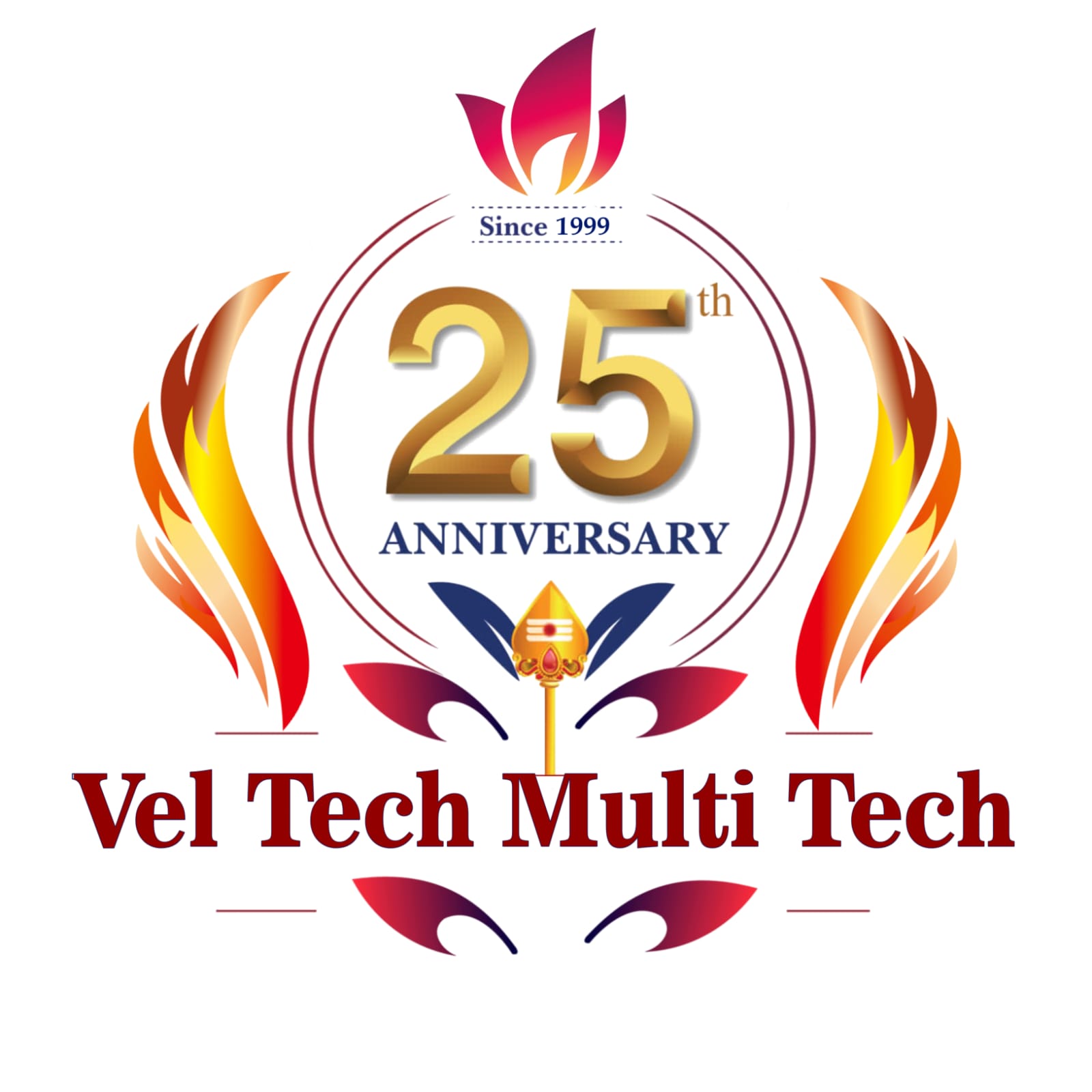ELECTRONICS AND COMMUNICATION ENGINEERING
ABOUT THE DEPARTMENT
The Department of Electronics and Communication Engineering was established in the year 2000 with an initial sanctioned strength of 60 and it was increased to 120 in the year 2002. Our Mission is to provide quality education to the students and impart Communication excellence in them. Apart from making them good technocrats, we also provide individual attention to make them good citizens of our nation to serve the industry and society constructively. The Department offers a PG course M.E. degree in VLSI Design which was introduced in the year 2008. The Department has been accredited by NBA for 3 Years and is permanent affiliated by Anna University. The Department has received a grant from the DST, Government of India, under FIST scheme. The Centre for Research, Anna University has approved the Department as Research Centre. We have received grants from DST-SERB to enhance the Research and Development. The Department was also awarded by AICTE – CII for best industry linked institute. We have a team of committed faculty members who are not only well qualified but are also backed by rich industrial / research / teaching experiences. The department has a fully equipped state of art laboratories that functions with seven curriculum laboratories which includes Engineering Practices Lab / Electron Devices Lab, Electronic Circuits / Communication System Lab, Microprocessor & Microcontroller Lab, Microwave and Optical Lab, Network and Signal Processing Lab / DSP Lab, Advanced VLSI Design Lab, Digital and Integrated Circuits Lab and also we have Industry initiated laboratory and Research Laboratories. We have modernized our lab named Advanced VLSI Design Laboratory, sponsored by AICTE under the scheme of MODROBS.
VISION OF THE DEPARTMENT
To emerge as a centre of academic eminence in electronics and communication and related spheres through knowledge acquisition and propagation meeting global needs and standards.
MISSION OF THE DEPARTMENT
To impart quality education by inculcating fundamental knowledge in Electronics and Communication Engineering with due focus on research and industry practices.
To propagate lifelong learning.
To impart the right proportion of knowledge, attitudes and ethics in students to enable them take up positions of responsibility in the society and make significant contributions.
PROGRAMME EDUCATIONAL OBJECTIVES (PEO)
The objectives of a programme can be broadly defined on four counts. The programme educational objectives of engineering graduates of the Department of Electronics and Communication Engineering are
| PEOs | PROGRAMME EDUCATIONAL OBJECTIVES |
|---|---|
| PEO1 | Graduates will acquire strong foundation in basic science, mathematics and computing knowledge and get benefits in their professional career or higher education and research or technological entrepreneur. |
| PEO2 | Graduates will have analyze the trends in need of electronics engineering, design appropriate system to provide solutions that are technically sound, economically feasible and socially acceptable. |
| PEO3 | Graduates will have the ethical attitude, effective communication skills, and team work to adapt recent trends by engaging in lifelong learning. |
PROGRAMME OUTCOMES (POS)
| POs | PROGRAMME OUTCOMES |
|---|---|
| PO1 | Engineering knowledge: Enables to apply the knowledge of differential equations, integrals, matrix theory, Laplace, Fourier and z-transformation for engineering problems. |
| PO2 | Problem analysis: Enables to define Basic science, Circuit theory, Electromagnetic Field theory, Control theory and to apply them to analyze complex engineering problems. |
| PO3 | Design/development of solutions: Enables to configure and apply solutions to transmission and distribution networks, electrical apparatus and to handle the engineering aspects of Electrical Energy Generation and Utilization. |
| PO4 | Use research-based knowledge: Enable to analysis, synthesis and interpretate the data to provide valid conclusions. |
| PO5 | Modern tool usage: Enables to design, implement and evaluate computer-based system/tools to meet the desired needs. |
| PO6 | The engineer and society: Enables to apply the knowledge gained to assess societal, health, legal and cultural issues, and consequent responsibilities relevant to the professional engineering practice. |
| PO7 | Environment and sustainability: Enables to understand the impact of the Electrical Engineering solutions in societal and environmental contexts and demonstrates the knowledge of and need for sustainable development. |
| PO8 | Ethics: Apply ethical principles and commit to professional ethics and responsibilities and norms of the engineering practice. |
| PO9 | Individual and team work: Enables to function effectively on teams to full-fill the goals. |
| PO10 | Communication: Enables to express the dynamic solutions to fit-into the engineer community. |
| PO11 | Project management and finance: Demonstrate knowledge and understanding of engineering and management principles, and apply these to one’s own work, as a member or a leader in a team. |
| PO12 | Life-long learning: Enables to recognize the need for, and have the preparation to engage in continuing professional development. |
PROGRAMME SPECIFIC OUTCOMES (PSO)
| PSOs | PROGRAM SPECIFIC OUTCOMES |
|---|---|
| PSO1 | Demonstrate and analysis of Electronic systems through analog and digital circuits. |
| PSO2 | Design and Develop models to progress on latest technological improvement in the fulfillment of electronics, communication and computing knowledge. |
| PSO3 | Identify the environmental requirements and able to provide technological assistance to the society by acquired technical knowledge. |
PROGRAM OFFERED:
B.E [Electronics and Communication Engineering]
Intake: 120
ECE R-19: VTMT Syllabus (Applicable for batches admitted from 2019-2020)
M.E [VLSI Design]
Intake: 09
ECE R-19: VTMT Syllabus (Applicable for batches admitted from 2019-2020)
HEAD OF THE DEPARTMENT
Dr.V.PRABHU
Professor & Head of the Department
-----
Dr. V.Prabhu is Professor & Head in the Department of Electronics and Communication Engineering of Vel Tech Multi Tech Dr.Rangarajan Dr.Sakunthala Engineering College,Avadi,Chennai,Tamil Nadu, India.
FACULTY PROFILE
STAFF ROOMS
LABORATORIES
CLASS ROOMS
| 2023 - 2024 | ||||
|---|---|---|---|---|
| S.No | DATE OF VISIT | YEAR | NAME OF THE INDUSTRY | ADDRESS |
| 1 | 18.11.2023 | II/III | BSNL | Chennai |
| 2 | 19.09.2023 & 20.09.2023 | III/V | TVS Motors Ltd. | Hosur |
| 3 | 23.08.2023 & 24.08.2023 | III/V | National Institute of Wind Energy | Chennai |
| 2022 - 2023 | ||||
|---|---|---|---|---|
| S.No | DATE OF VISIT | YEAR | NAME OF THE INDUSTRY | ADDRESS |
| 1 | 06.04.2023 | III/VI | Eaton Power Quality Pvt Ltd | Pondichery |
| 2 | 17.03.2023 | II/IV | National Institute of Ocean Technology | Pallikaranai |
| 3 | 21.02.2023 & 22.02.2023 | II/IV | Global Automotive Research Centre | Sriperumbudur |
| 4 | 03.12.2022 | IV/VII | TVS Motor Company Limited | Hosur |
| 5 | 28.11.2022 & 29.11.2022 | III/V | Global Automotive Research Centre | Sriperumbudur |
| 6 | 28.10.2022 & 29.10.2022 | II/III | RGMTTC- BSNL | Meenambakkam |
| 2021 - 2022 | ||||
|---|---|---|---|---|
| S.No | DATE OF VISIT | YEAR | NAME OF THE INDUSTRY | ADDRESS |
| 1 | 26.09.2022 | III/VI | Sivanesan Company | Thiruvallur |
| 2 | 02.09.2022 | III/VI | Neyveli Lignite Corporation Limited | Neyveli |
| 3 | 11.06.2022 | III/VI | Bharat Heavy Electricals Limited | Ranipet |
| 4 | 07.06.2022 | II/IV | Sathish Dhawan Space Centre SHAR | Sriharikotta |
| 5 | 25.04.2022 | II/IV | Sivanesan Company | Thiruvallur |
| 6 | 24.12.2021 | II/III | RGMTTC- BSNL | Meenambakkam |
| 7 | 21.12.2021 & 22.12.2021 | III/V | RGMTTC- BSNL | Meenambakkam |
| 2023 - 2024 | ||||
|---|---|---|---|---|
| S.No | FACULTY NAME | COURSE NAME | TOPIC | YOUTUBE LINK |
| 1 | Dr.P.Sharmila | Signals and Systems | Review of signals and systems | https://youtu.be/2smWkeCLWJc |
| 2 | Dr. M. Suganthy | Wireless Networks | Sub net Mask | https://youtu.be/CWJduxpDyzM |
| 3 | Ms.G.Sahaana | Semiconductor Devices | LCD and LED | https://youtu.be/nbK-ktnt1Mo |
| 4 | Mrs. S. Leo Pauline | Digital Communication | Convolution Coding | https://youtu.be/5Z1hIbqx018 |
| 5 | Ms.S.Leo Pauline | Digital Communication | Quadrature Phase Shift Keying (Qpsk) | https://youtu.be/K1fIEzTRAtI |
| 6 | Dr.S.Ashok | Electronics Circuits -I | Multistage Amplifier | https://youtu.be/OePn_wQdxCY |
| 7 | Mr.K Saravanan | Optical Communication | Optical Communication Link and Fiber Types | https://youtu.be/AmwwzReriE8 |
| 8 | MS.P.Nithya | ADHOC and Wireless Sensor Networks | Destination Sequenced Distance Vector Routing Protocol | https://youtu.be/qYIGUbHF0pc |
| 9 | Mr. S. Ashok | Electronic Circuits I | Biasing-fixed bias and voltage divider biasing in BJT | https://youtu.be/b8Y8twqRjbg |
| 10 | Mr. Vishnu Vardhan Rao.G | CMOS Analog IC Design | Flash Architecture | https://youtu.be/Vx01iO0OpRA |
| 11 | Mrs. Leo Pauline.S | Communication Engineering | Amplitude modulation concepts with power and efficiency calculation |
https://youtu.be/0HUkjaCeHA0 |
| 12 | Mrs.Arthy P S | Electromagnetic Interference Compatibility | Sources and Victims of Electromagnetic interference | https://youtu.be/IacaASL1hPM |
| 13 | Mrs. Kalpana R | Digital Communication | Analog to digital conversion , Block diagram of digital communication |
https://youtu.be/pg7IdVWHawo |
| 14 | Ms. Nithya P | Digital Communication | Error control technique by Hamming code method | https://youtu.be/D17MYq0oBRI |
| 15 | Dr.M.Suganthy | Digital Image Processing | Spatial domain filtering | https://youtu.be/qqv8XsGM7Ms |
| 16 | Mr. Vishnu Vardhan Rao | Digital Electronics | Counters – synchronous and asynchronous | https://youtu.be/hcSg92V9s6c |
| 17 | Mr.J.T. Arun Raghesh | Microprocessor And Microcontroller | Addressing modes of 8086 | https://youtu.be/_augnLH_Wkg |
| 18 | Mrs.S.Lakshmi | Electron Devices And Circuits | Silicon controlled rectifier | https://youtu.be/hgasums5Ow0 |
| 19 | Mrs.S.Lakshmi | Electronic Circuits-II | Feedback amplifiers | https://youtu.be/VqjS3p9fyCg |
| 20 | Ms. Nithya P | Electromagnetic Interference Compatibility | EMI Mitigation Techniques | https://youtu.be/Z_oI1d3v-p8 |


